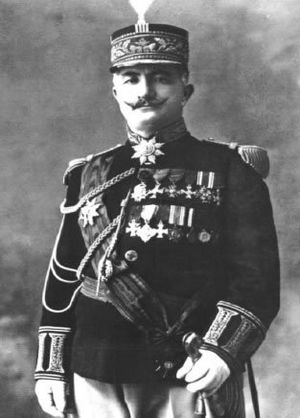Agha Petros facts for kids
Quick facts for kids
Petros Elia of Baz
ܦܸܛܪܘܿܣ ܐܹܠܝ݂ܵܐ ܕܒܵܙ |
|
|---|---|
 |
|
| Birth name | Petros Elia |
| Nickname(s) | Agha Petros |
| Born | April 1880 Baz, Hakkari, Ottoman Empire |
| Died | 2 February 1932 (age 51) Toulouse, France |
| Allegiance | Allies of World War I, Assyrian volunteers during World War I |
| Years of service | 1914–1919 |
| Commands held | Assyrian volunteers, later the Assyrian Levies |
| Battles/wars | World War I
|
| Awards | Croix de Guerre (France) Ordre national de la Légion d'honneur (France) |
Petros Elia of Baz (Syriac: ܐܝܠܝܐ ܦܹܛܪܘܼܣ) (April 1880 – 2 February 1932), better known as Agha Petros, was an Assyrian military leader during World War I.
Contents
Early years
Petros Elia was from the Lower Baz village, Ottoman Empire in 1880. There he received his elementary education before attending a European missionary school in the Persian city of Urmia. After finishing his studies, he went back to his village of Baz and became a teacher there. It was thanks to his fluency in numerous languages, including Syriac, Turkish, Arabic, French, Persian, Kurdish, English, and Russian, he was appointed by the Ottomans as a secretary, and as a Consul in Urmia briefly in 1909.
World War I
After the Russians entered Urmia, Agha Petros was appointed as a general with a small Assyrian force under his command. He later engaged and defeated forces of Ottoman and Kurds in a series of battles. He was later approached by the Allies and was given command of the left wing of the army of Assyrian volunteers (the right wing being commanded by Mar Shimun’s brother Dawid Mar Shimun, the center being under the command of Mar Shimun).
His volunteers had quite a few successes over the Ottoman forces, notably at Suldouze where Petros’ 1,500 horsemen overcame the forces of Kheiri Bey's (8,000 men). Petros also defeated the Ottomans in a major engagement at Sauj Bulak and drove them back to Rowanduz.
Agha Petros defeated the Turks in Sauj Bulak and drove them back to Rowanduz. He sometimes had limited control over Armenians and other Assyrian forces, and was indeed mistrusted by quite a few of them. There was disunion in the ranks, and instead of posting a force to contain the Turks, whom he had defeated previously, he moved his forces to Sain Kala as encouraged by the British officials, who had promised him military help. Nevertheless, the British did not fulfill their promises. He reached Sain Kala seven days after the British detachment retired.
After the invasion of Mosul by the Young Turks, the Assyrian army, led by General Agha Petros, fought intensively and successfully against the Ottoman army and their Kurdish allies, and pushed them out of Mosul and the whole area, leading to Britain's control of the region. The battles are described in detail by surviving letters of Petros and British officials.
Agha Petros also had some disagreements with Mar Shimun, the patriarch of the Assyrian Church of the East, and was often mistrusted by his family. The Allied military advisors reported that he schemed against Mar Shimun, by trying to dissuade the Allies to trust the Patriarch. However, after the murder of Mar Shimun by the Iranian Kurdish leader Simko, Agha Petros joined forces with Malik Khoshaba and others in driving Simko from his stronghold at Koynashahr.
Later years
Petros was the head negotiator for the Assyrians between 1919 and 1923. On July 24, 1923, he took part in the League of Nations Peace Conference in Lausanne, Switzerland, where he approached the Turkish delegation for the resettlement of the Assyrians in and around Hakkâri Province in exchange for the loyalty of the Assyrians. The then secretary/minister of foreign affairs of Turkey, İsmet İnönü who was heading the Turkish delegation at Lausanne was in favor of the resettlement but a telegram received from the central government in Ankara prevented that.
During his last years Petros moved near Toulouse, France, where he lived until his death of a cerebral attack at the railway station, on February 2, 1932.
See also
- Assyrian people
- Assyrian genocide

